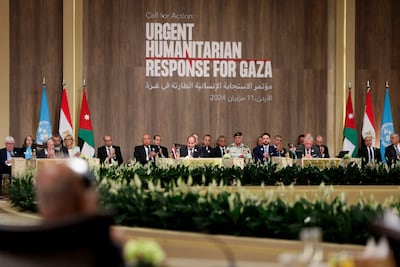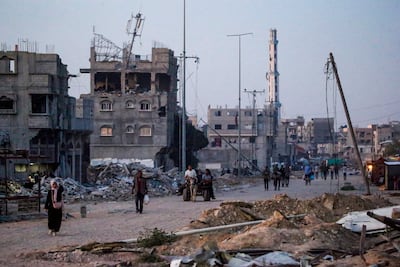Live updates: Follow the latest news on Israel-Gaza
Humanitarian assistance to Gaza “cannot wait for a ceasefire and cannot be subject to the political agendas of any party”, King Abdullah II of Jordan said at an emergency humanitarian conference for Gaza on the shores of the Dead Sea on Tuesday.
“We cannot abandon Gaza. It should be everyone’s priority because history will judge us by our actions,” the king told the UN-backed Call for Action: Urgent Humanitarian Response for Gaza conference, which is seeking aid and set on improving the dire humanitarian situation in Gaza after more than eight months of war.
Egypt’s President Abdel Fattah El Sisi and UN Secretary General Antonio Guterres co-hosted the conference.
Sheikh Abdullah bin Zayed, UAE Minister of Foreign Affairs, and Palestinian President Mahmoud Abbas were among those in attendance, while US Secretary of State Antony Blinken addressed the conference as part of his visit to the region to try to win a ceasefire between the Palestinians and the Israelis.
The conference aims to accelerate fund-raising for Gaza, and go beyond basic requirements such as food and shelter, a Palestinian humanitarian official told The National before the event.
King Abdullah said that providing aid through land routes remained the “most effective” way of delivering it, and called for hundreds more lorries to be mobilised to provide a sustained flow of assistance.
However, he said Jordan would continue dropping aid into Gaza by plane, “despite the impediments”.
Israel controls all the major land entries to the enclave and has restricted the number of lorries allowed to enter.
Jordan is also considering using helicopters to deliver aid “in the short term, and once there is a ceasefire”, the king said.
“The quality and quantity of aid to Gaza is key and equally important,” he said, adding that medicine, water and materials for shelter should be delivered.
“We can’t wait months to mobilise these sources into action. What we have today is simply far from what we need.”
US pledges aid
Mr Blinken announced more than $400 million in US aid to Palestine at the conference.
The US would provide $404 million “in life-saving humanitarian aid to support Palestinian civilians in Gaza, the West Bank and the region”, the State Department announced.
It said the US had now provided “more than $674 million over the past eight months”.
“Some have expressed great concern over the suffering of the Palestinian people in Gaza, including countries with the capacity to give a lot that have provided very little or nothing at all,” Mr Blinken told the conference.
“It is time for everyone – everyone – to step up. And for those who have already given and given generously, give more.”
He also said that Israel “must do more” to allow aid into Gaza.
“Israel has taken some important steps to open more crossings to address obstacles to delivery of assistance but it can and must do more,” he said.
Mr Blinken did not specify how the US would deliver the assistance, as Congress has banned further contributions to the UNRWA, the UN agency for Palestinian refugees that is the main distributor of aid in Gaza.
Washington has previously provided aid through the UN's World Food Programme and private groups.

Ceasefire calls
The event comes as part of mounting international pressure on Israel and Hamas to agree to a ceasefire.
Mr Blinken repeated his claim to the conference that Hamas is the “only one thing” standing in the way of a ceasefire.
Hamas announced on Monday that it had accepted the UN Security Council's ceasefire resolution and is ready to talk about the details.
During his visit to Israel, Mr Blinken said Prime Minister Benjamin Netanyahu had “reaffirmed his commitment” to a ceasefire proposal at a meeting on Monday.
However, both warring parties still have to overcome key sticking points, in particular Mr Netanyahu’s insistence that fighting in Gaza will end only when Israel has achieved its war aims, which include the destruction of Hamas.
The UAE repeated its call for an “immediate and permanent ceasefire in Gaza”, following Sheikh Abdullah's participation in the conference.
“Dealing with the humanitarian crisis and ending the suffering of the Palestinian people necessitates adopting a comprehensive strategic approach to ensure a resolution to the Israeli-Palestinian conflict,” state news agency Wam reported.
More than 37,100 Palestinians have been killed in the war, which began when Hamas led an attack on southern Israel that killed about 1,200 people. Since then, more than 84,000 people have been injured in Israel’s mass bombardment of Gaza, which has destroyed vast areas of the enclave, including most of its schools and hospitals.
Mr Blinken, whose administration has repeatedly backed Israel's right to self defence, said Israel must do more to prevent civilian casualties in Gaza.
King Abdullah also highlighted the violence in the occupied West Bank, where, he said, “hundreds of children have been killed and injured, while settler attacks, settler expansion and economic sanctions restrict movement”.
Mr Blinken also met Palestinian Authority Prime Minister Mohammad Mustafa, whose administration governs the West Bank. Mr Blinken welcomed the PA's announced reforms and reaffirmed US support for “an independent Palestinian state with security guarantees for Israel”, spokesman Matthew Miller said.

'The horror must stop'
Alongside King Abdullah and Mr Blinken, UN officials and representatives from the region addressed the conference.
Mr Guterres repeated his call for a ceasefire in Gaza at the conference, and said “the horror must stop”.
“The speed and scale of the carnage and killing in Gaza is beyond anything in my years as secretary general,” he said.
About 60 per cent of Gaza's buildings and 80 per cent of commercial facilities have been damaged by Israeli bombardment, while health and educational facilities are “in rubble”, he added.
At least 50,000 children are suffering from malnutrition, one million Palestinians do not have access to clean water and 1.7 million people – more than 75 per cent of Gaza's population – are internally displaced, “many, several times over”, Mr Guterres said.
“Nowhere is safe. Conditions are deplorable. The public health situation is beyond crisis levels. Gaza's hospitals lie in ruins. Medical supplies and fuel are scarce to non-existent.
“All available routes into Gaza must be operational,” he said, referring to Israel's continued closure of all border crossings, which are vital for the delivery of aid, food and medical assistance.
The UN's chief emergency relief co-ordinator, Martin Griffiths, said he could only reiterate the “critical importance of acting swiftly and decisively to pull Gaza and its people back from the abyss that they know so well”.
Summarising the discussions of the three working groups at the conference, Mr Griffiths said that ultimately the “only way to fully and effectively address the humanitarian needs in Gaza is, very simply, an immediate and permanent ceasefire”.

Restrictions on aid
The reality in Gaza is “much, much worse” than suggested by the facts and figures being reported from the ground, as an exact assessment of the situation is difficult while “bombs are raining down”, the Norwegian Refugee Council’s head of advocacy in the Mena region told The National.
“The information that is coming out gives us a picture of the catastrophe but is only the tip of the iceberg and an underestimate of the suffering in Gaza,” Samah Hadid said at the conference.
While the security situation continues to deteriorate, Ms Hadid said providing aid was “virtually impossible”.
“Bombardment and insecurity is everywhere … there is no safety and no such thing as a safe zone in Gaza,” she said.
The NRC, like other groups, continues to send aid to Gaza's border crossings, which are controlled by Israel. But lorries full of aid are being turned back, due to Israel’s “arbitrary” rejection policy, she said.
“Items rejected by Israeli government are arbitrary. There’s an arbitrary list” of prohibited items, she said, corroborating what other international aid groups have been reporting. The UN has previously said an entire lorryload of aid was turned away because it contained medical scissors found in a children’s surgical kit.

Ms Hadid said items such as “sleeping bags” and other critical supplies have been rejected “on an ad hoc basis, giving no legitimate reason”.
Sometimes, it is “too late” to distribute the aid after it has finally been allowed in or it becomes unsafe to distribute, as much of it has expired, she said.
“We need the Israeli government to stop the deliberate restriction of aid.”
Ms Hadid also said Israeli allies such as the US are not doing enough to pressure Israel to stop the war in Gaza while they continue to supply arms to the country.

